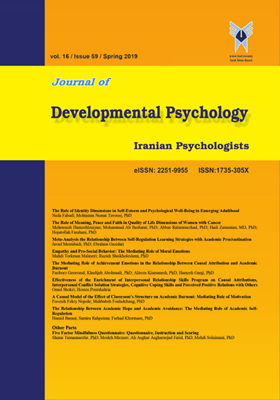Five Factor Mindfulness Questionnaire: Instruction and Scoring
Subject Areas : روانشناسی تحولیShima Tamannaeifar 1 * , Mosleh Mirzaee 2 , Ali Asghar Asgharnejad Farid 3 , Mehdi Soleimani 4
1 - PhD in Clinical Psychology
Tehran University of
Medical Sciences
2 - MA in Clinical Psychology
Iran University of
Medical Sciences
3 - PhD
Iran University of
Medical Sciences
4 - PhD
Tehran University of
Medical Sciences
Keywords:
Abstract :
تمناییفر، ش.، اصغرنژاد فرید، ع. ا.، میرزایی، م. و سلیمانی، م. (1395). ویژگیهای روانسنجی پرسشنامه پنج عاملی ذهنآگاهی. فصلنامه روانشناسی تحولی: روانشناسان ایرانی، 47(12)، 329 -321.
Baer, P. A., Smith, G. T., Hopkins, J., Krietemeyer, J., & Toney, L. (2006). Using Self-Report Assessment Methods to Explore Facets of Mindfulness. Assessment,13, 27-45.
Heeren, A., Douilliez, C., Peschard, V., Debrauwere, L., & Philippot, P. (2011). Cross-cultural validity of the Five Facets Mindfulness Questionnaire: Adaptation and validation in a French-speaking sample. European Review of Applied Psychology, 61(3), 147-151.
Lilja, J. L., Frodi-Lundgren, A., Hanse, J. J., Josefsson, T., Lundh, L. G., Skold, C., & Broberg, A. G. (2011). Five facets mindfulness questionnaire-reliability and factor structure: A Swedish version. Cognitive Behaviour Therapy, 40 (4), 291-303.
Sugiura, Y., Sato, A., Ito, Y., & Murakami, H. (2012). Development and validation of the Japanese version of the Five Facet Mindfulness Questionnaire. Mindfulness, 3(2), 85-94.
Cebolla, A. García - Palacios, A., Soler J., Guillen, V., Banos, R., & Botella, C. (2012). Psychometric properties of the Spanish validation of the Five Facets of Mindfulness Questionnaire (FFMQ). European Journal of Psychiatry,26 (2),118-126.
_||_

